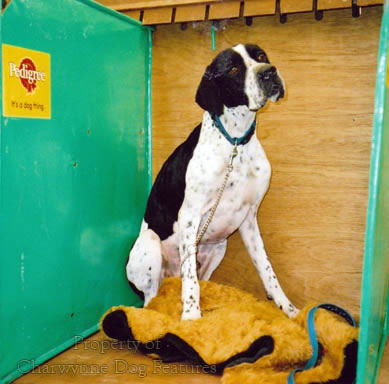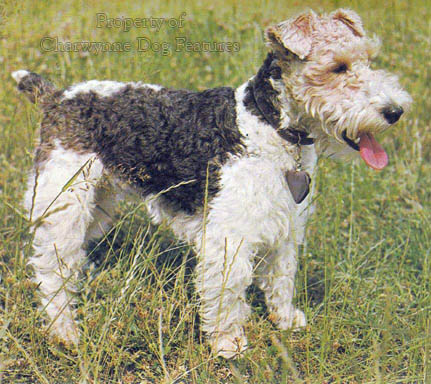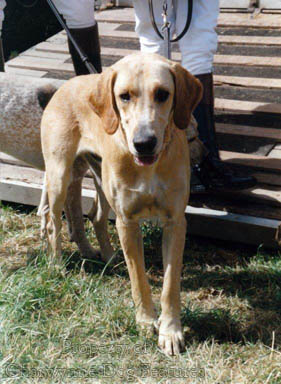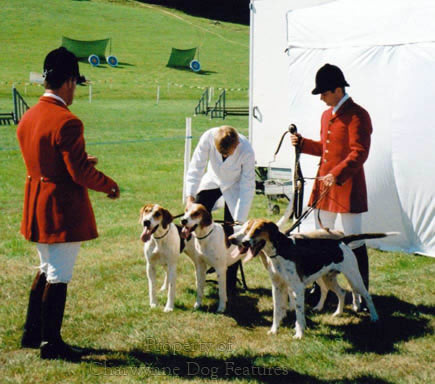812 FUNCTION: THE ONLY PEDIGREE
FUNCTION: THE ONLY PEDIGREE
by David Hancock
 Looking for a new dog? How often must the public, when looking for a potential pet, go to the livestock columns of the classified advertisements of their local paper - only to be dazzled by another piece of paper, the pedigree. "Bull Terrier pups for sale, excellent pedigree"..., "Springer Spaniel puppies for sale, good pedigree"...and "Adorable young Bloodhound for sale; KC registered; Crufts' champion in pedigree"...We've all seen such notices and all good dogmen must groan when they see such wording. Are we buying a certificate or a living creature designed to have a function?
Looking for a new dog? How often must the public, when looking for a potential pet, go to the livestock columns of the classified advertisements of their local paper - only to be dazzled by another piece of paper, the pedigree. "Bull Terrier pups for sale, excellent pedigree"..., "Springer Spaniel puppies for sale, good pedigree"...and "Adorable young Bloodhound for sale; KC registered; Crufts' champion in pedigree"...We've all seen such notices and all good dogmen must groan when they see such wording. Are we buying a certificate or a living creature designed to have a function?
But if it is the certificate that attracts the unwary, how valid is it? A recent survey of registered pedigrees in the United States indicated that something in the region of 13% of registrations there were falsified. The Danish geneticist Winge examined the Danish Kennel Club records some years ago and found numerous cases of where, genetically, offspring simply could not have come from the parents as registered. Our own Kennel Club will take stern action if papers are falsified but they rely, in the end, on the honesty of the breeder. But some of these breeders knowingly breed from dogs carrying the genes of hereditary diseases. Can you ever expect people like that to conduct themselves honourably in other aspects of their involvement with dogs?
There is everything to be said in favour of breeding records. And it is entirely understandable for the public to want to choose a breed of dog and know what a puppy will grow into. But when we revere pure-breeding at a time when there are over 400 inheritable diseases in the pure-bred dog and have more regard for the written pedigree than the pet, there is something seriously wrong with the public perception of dogs. The KC would claim that the written pedigree is merely a true record of ancestry, not a declaration of excellence. American and Danish researchers might argue with them but the public have unwittingly come to regard the written pedigree as some kind of certificate of merit, some kind of kitemark.
 No one who seeks excellence of performance from sporting and working dogs would question the good sense of selective breeding by knowledgeable fanciers. But the absurd contemporary reverence for the pedigree has got completely out of hand. Those worthy gundog men who established the Kennel Club and conformation dog shows in order to promote excellence must be turning in their graves. We have not kept faith with their ideals. Which Pointer is the more valuable: one bought in Ireland without papers going on to win a Field Trial or one with papers and a hackney action winning the Gundog Group at Crufts'? (The latter occurred under a revered KC-approved judge and it enhanced the value of the dog's progeny). "Worship of the pedigree" is very much a modern phenomenon; it probably results from the twentieth century tendency to value dogs for what they look like rather than what they can do.
No one who seeks excellence of performance from sporting and working dogs would question the good sense of selective breeding by knowledgeable fanciers. But the absurd contemporary reverence for the pedigree has got completely out of hand. Those worthy gundog men who established the Kennel Club and conformation dog shows in order to promote excellence must be turning in their graves. We have not kept faith with their ideals. Which Pointer is the more valuable: one bought in Ireland without papers going on to win a Field Trial or one with papers and a hackney action winning the Gundog Group at Crufts'? (The latter occurred under a revered KC-approved judge and it enhanced the value of the dog's progeny). "Worship of the pedigree" is very much a modern phenomenon; it probably results from the twentieth century tendency to value dogs for what they look like rather than what they can do.
How often too has a "nod and a wink" accompanied registration applications from unscrupulous breeders in the past? The Borzoi blood in the Rough Collie and the St. Bernard blood in the Mastiff manifests itself more and more with each generation. The use of wire-haired Fox Terrier blood to 'improve' the Welsh Terrier, of Rough Collie blood to 'coat up' the pedigree Border Collie, of Foxhound blood a few decades ago in the Labrador and of Great Dane blood in the Irish Wolfhound is known but does not feature in their breed records. There are owners of expensive pure-bred dogs with written pedigrees which they proudly exhibit but which are not true records of the animal's breeding.
All of this will make the working terrier and lurcher devotees shake their heads knowingly. But unknowingly they are the only dog breeders to remain true to our national heritage. Rarely are they dazzled by pieces of paper! Sensible people seeking good sound functional lurchers and terriers go to known breeders. "Papers" are never the major desideratum. Some enlightened gundog men have long done the same. The best bred dogs in Britain for over two centuries are almost certainly those in the hunting packs, staghounds, foxhounds, harriers and beagles valued for their ability in the field rather than the purity of their pack or their papers.
All of us who care about dogs and the future of our famous breeds need to break down this absurd unmerited contemporary obsession with the written pedigree. Every year the Kennel Club bans breeders who falsify pedigrees but they don't catch many. Cases in which a dead Bullmastiff is recorded as having sired litters shows how no checks are made on breeders' submissions. I don't expect to see advertisements such as: "Basset Hound (prone to slipped discs) for sale"...or "Golden Retriever (prone to hip dysplasia) at stud"...or "Skye Terrier (quite unlike its ancestors) for sale"... But perhaps one day, nudged by the Sale of Goods and Trades Descriptions Acts, our local press will feature a more valuable style of 'dog for sale' notice, on the lines of: "For sale, healthy yellow Labrador puppy, parents hip-scored, eye-tested, with sound temperament and no known inheritable diseases..." Does that not mean more than the empty boast of 'excellent pedigree'?